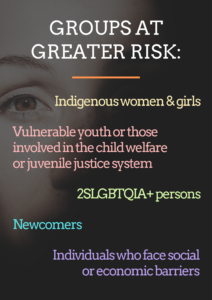Sexual Exploitation & Human Trafficking
What is Sexual Exploitation & Human Trafficking?
- Sexual Exploitation (in-person or online) refers to anyone under 18 years of age who is exchanging a sexual act for something in return. It involves manipulating, tricking, forcing, or blackmailing a young person. Sexual exploitation does not necessarily end at the age of 19. It is also present in the adult sex industry.
- Human trafficking involves the recruitment, transportation, harboring, and/or exercising control or influence over someone’s movements to exploit them, typically through sexual exploitation or forced labor.
Who is at risk?
 Anyone is at risk, regardless of their background or status. However, these types of crimes mostly affect women and girls.
Anyone is at risk, regardless of their background or status. However, these types of crimes mostly affect women and girls.
Groups who are at a greater risk include:
- Indigenous women and girls.
- Vulnerable youth or those involved in the child welfare or juvenile justice system.
- 2SLGBTQIA+ persons.
- Newcomers.
- Individuals who face social or economic barriers.
Key Terms to Know
What is grooming? (click to expand) »
Grooming is when someone tries to control another person by making them feel comfortable with manipulative behaviors. This often happens to children or adults targeted by the person doing the grooming. By normalizing certain expectations and behaviors, the groomer gains power over the victim.
To learn more, check out this video from the Government of Canada.
What is sexting? (click to expand) »
Sexting is when someone sends or shares sexual images or videos with other people. This could be someone they know, trust, or strangers they meet online. Children or teens might think it’s harmless or nothing bad can happen, but once the image is sent, it is out of their control and could end up hurting themselves or someone else.
To learn more, check out this video from the Government of Canada.
What is sextortion? (click to expand) »
Sextortion is when someone threatens to send a sexual image or video of an individual if they do not give more sexual content, pay them, or do what they ask.
To learn more, check out these videos from Sexual Exploitation Education (SEE):
What is capping? (click to expand) »
Capping is the act of secretly recording or taking screenshots of someone engaging in sexual activities on various video streaming platforms, without their knowledge. The material may be used to extort or share with others without consent.
To learn more, check out this video from the Government of Canada.
It’s important to remember, these crimes are illegal and never the victim’s fault.
Free Online Training
- Notified – Virtual Training abut Online Sexual Exploitation of Youth in Canada (Coalition Against the Sexual Exploitation of Youth (CASEY))
- Interactive E-Learning Course – Mobilizing Communities to Disrupt Sexual Exploitation and Sex Trafficking in Canada (Not in My City)
- Human Trafficking 101 (Action Coalition on Human Trafficking (ACT) Alberta)
- Grooming for the Purposes of Exploitation and Abuse: What Caregivers and Educators Should Know Webinar (Saskatchewan Prevention Institute)
- The Parent Network: Social Media and Your Kids Workshop (Media Smarts)
- Zoe & Molly Online – Comics, games and safety tips for children (Canadian Centre for Child Protection)
Video Playlist: What is Youth Sexual Exploitation?
Check out the video playlist, “What is Youth Sexual Exploitation,” from Thrive Community Youth Network.
Services related to this information:
- Contact your Public Health Nurse.
- 811 HealthLine (Newfoundland & Labrador) – Call 811 or 1-888-709-2929 / TTY 1-888-709-3555
- 811 is free and confidential. 811 is available 24/7 and can provide support with mental health and addictions issues and more.
- Services formerly offered by the Provincial Mental Health Crisis Line are now offered by 811. Call 811 to speak with a registered nurse who is also a trained crisis intervener.
- NL Sexual Assault Crisis and Prevention Centre – 1-800-726-2743
- 2SLGBTQIA+ Warm Line – Planned Parenthood – NL Sexual Health Centre (plannedparenthoodnlshc.com) call/text 1-866-230-8041
- Coalition Against the Sexual Exploitation of Youth (CASEY) – (709) 754-0536 ext. 203
- Association for New Canadians (709) 722-6980 or toll free 1-833-222-0921
- Violence Prevention Inititative (Newfoundland and Labrador)
- Bridge the gapp
Newfoundland and Labrador’s ‘go-to’ website for mental health information. Bridge the gapp offers self-help resources, links to local services, and invites people to share their personal stories. Bridge the gapp is free of cost and available to every resident in the province. The site is divided into adult and youth sections, however many services are appropriate for both.- Kids Help Phone e-mental health services 24/7 across Canada call 1-800-668-6868 or text 686868
- Royal Newfoundland Constabulary (RNC) – Call 1-709-729-8000 or for online reporting, please click here.
- Royal Canadian Mounted Police (RCMP)

